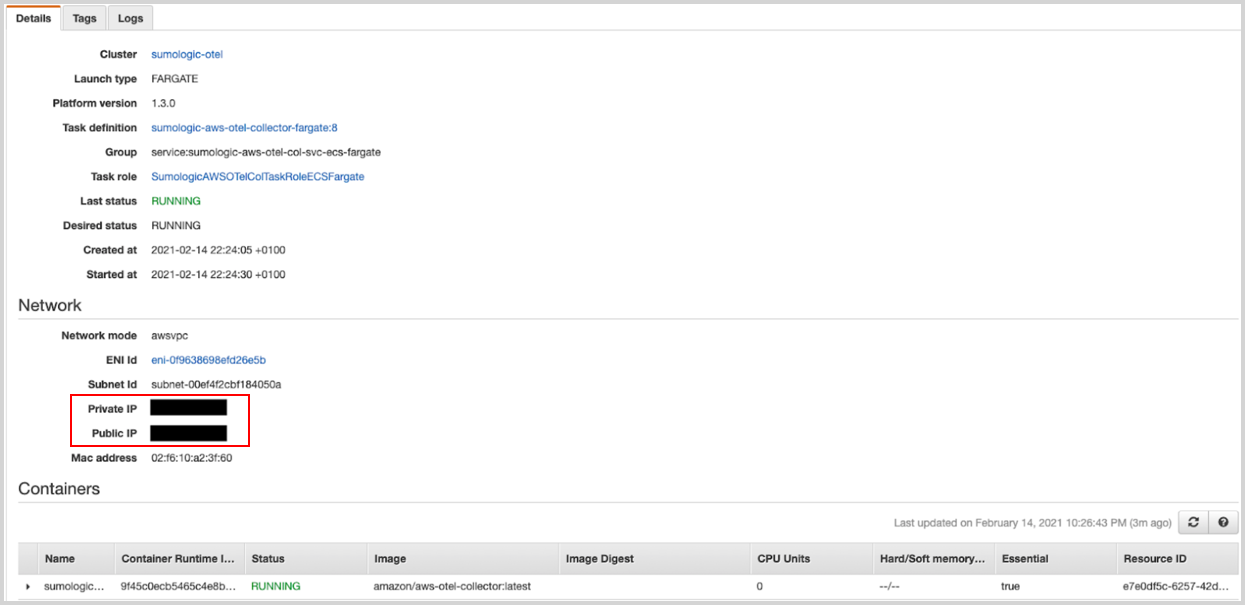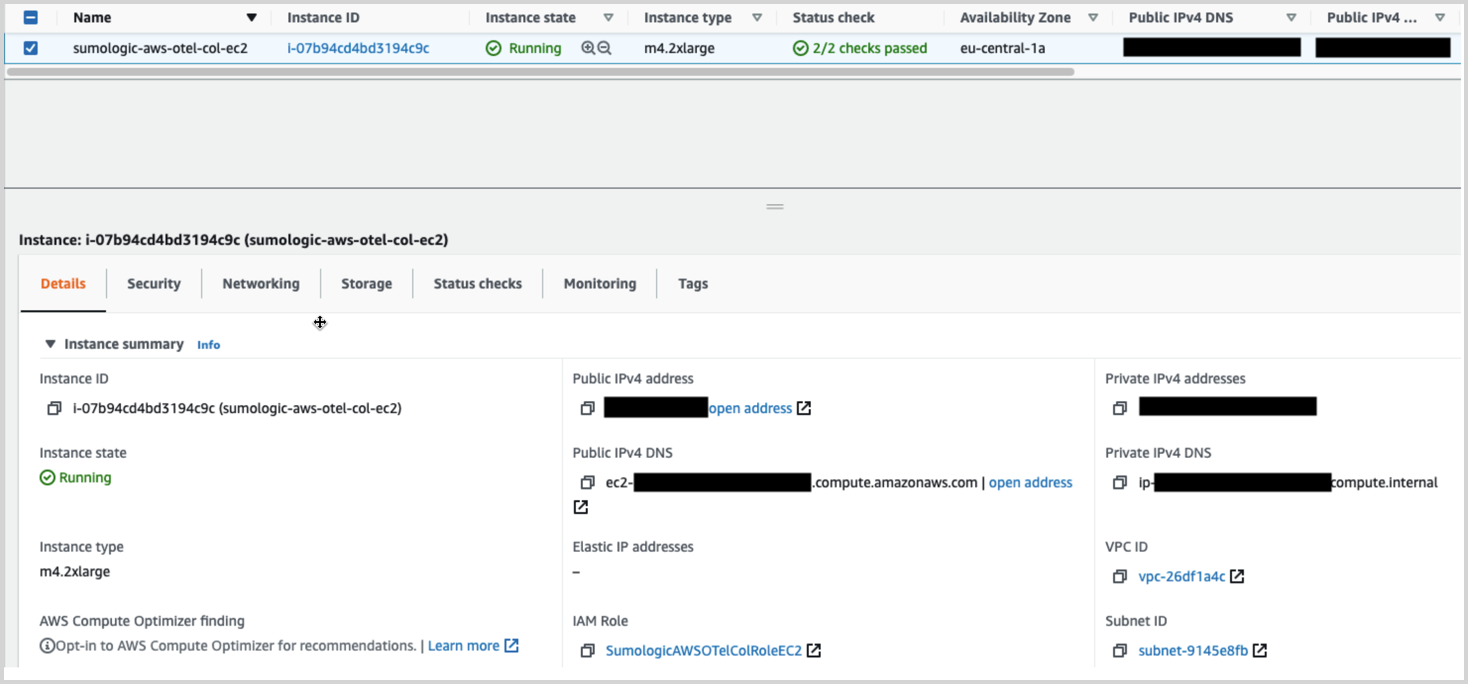Set up Traces Collection for AWS Environments
To collect traces in non-Kubernetes AWS environments like EC2 or ECS (including Fargate), you can install the Sumo Logic Distribution for OpenTelemetry. Collecting telemetry data and sending it to Sumo Logic, the official partner and contributor to the project, has never been easier.
Prerequisites
- OTLP/HTTP source.
- An installed and configured AWS Command Line Interface tool.
| Account Type | Account Level |
|---|---|
| Credits | Enterprise Operations and Enterprise Suite Essentials get up to 5 GB a day |
Telemetry data collection
AWS provides a few alternative scenarios for setting up the Collector. Documentation related to the configuration and installation of the Sumo Logic Distribution for OpenTelemetry Collector for specific AWS Services can be found below.
Sumo Logic Distribution for OpenTelemetry Collector configuration scenarios
Amazon Elastic Container Service (ECS)
In the case of ECS, there are two possible deployment configurations. Sumo Logic Distro can be installed on the cluster of EC2 instances (Scenario 1 below) or ran on AWS Fargate (Scenario 2 below).
The installation and configuration are just a few steps, described below.
You'll need an ECS Cluster where the Sumo Logic Distribution for OpenTelemetry Collector will be deployed. The guide can be found here.
Scenario 1: Sumo Logic Distribution for OpenTelemetry Collector installation on ECS EC2
-
Download the CloudFormation template file which will be used later to install the Collector:
curl -O https://raw.githubusercontent.com/SumoLogic/sumologic-otel-collector/main/examples/aws/ecs-ec2-deployment.yaml -
Download the Sumo Logic Distribution for OpenTelemetry Collector configuration file:
curl -O https://raw.githubusercontent.com/SumoLogic/sumologic-otel-collector/main/examples/aws/config.yaml -
Set up the following environment variables that are needed to perform the Collector deployment.
CLUSTER_NAME. Your ECS Cluster name previously set up.AWS_REGION. Your ECS Cluster deployment region.TEMPLATE_PATH. Path to the template file from the first step.CONFIG_FILE_PATH. Path to the config file from the second step.SUMO_OTLP_HTTP_ENDPOINT_URL. Mandatory OTLP/HTTP source from prerequisites section.
-
It is necessary to provide the configuration to the Collector. This can be done by creating the parameter in the AWS Parameter Store by running the following command:
aws ssm put-parameter --name "sumologic-otel-col-config" --type "String" --data-type "text" --value "$(cat ${CONFIG_FILE_PATH} | awk -v url=$SUMO_OTLP_HTTP_ENDPOINT_URL '{gsub(/SUMO_OTLP_HTTP_ENDPOINT_URL/,url)}1')" -
Execute the command below to create an AWS CloudFormation stack that deploys the Collector on your cluster:
aws cloudformation create-stack --stack-name sumologic-aws-otel-col-ecs-ec2 --template-body file://${TEMPLATE_PATH} --parameters ParameterKey=ClusterName,ParameterValue=${CLUSTER_NAME} --capabilities=CAPABILITY_NAMED_IAM --region=${AWS_REGION} -
To check if everything was deployed go to the CloudFormation Stacks console and check if the sumologic-aws-otel-col-ecs-ec2 stack status is CREATE_COMPLETE.

-
The next step is to check if your deployment is properly running. Go to the ECS Console, select the proper region, and select the cluster you used to deploy the Collector. Navigate to the Tasks tab and check if the task is running.

-
Finally, select the task and click on the Networking tab. You'll find the information on where to send telemetry data.
If you plan to send data to the ECS Collector service from a container running in the bridge network mode using the same host, you can use Docker Gateway IP - 172.17.0.1 on EC2 Linux in the application environment variables. For example:
OTEL_EXPORTER_OTLP_ENDPOINT=http://172.17.0.1:4318
OTEL_TRACES_EXPORTER=otlp
However, with this configuration, the collector service task must be running in each of the used EC2 instances.
Scenario 2: Sumo Logic Distribution for OpenTelemetry Collector installation on ECS Fargate
- Download the CloudFormation template file which will be used later to install the Collector:
curl -O https://raw.githubusercontent.com/SumoLogic/sumologic-otel-collector/main/examples/aws/ecs-fargate-deployment.yaml - Download the configuration file.
curl -O https://raw.githubusercontent.com/SumoLogic/sumologic-otel-collector/main/examples/aws/config.yaml - Set up the following environment variables that are needed to perform the Collector deployment:
CLUSTER_NAME. Your ECS Cluster name setup from prerequisiteAWS_REGION. Your ECS Cluster deployment regionTEMPLATE_PATH. Path to the template file from the first stepCONFIG_FILE_PATH. Path to the config file from the second stepSUMO_OTLP_HTTP_ENDPOINT_URL. Mandatory OTLP/HTTP sourceSECURITY_GROUPS. It is mandatory for AWS Fargate deployment to provide a Security Group ID. They can be found in the AWS Console. Find the one configured for the cluster. In the case of multiple Security Groups use comma as separator, such assg-xyz,sg-xyz.
noteThe Sumo Logic Distribution for OpenTelemetry Collector can receive data from various receivers - these ports should be configured in the Security Group:
- OTLP - ports: 4317/tcp, 4318/tcp
SUBNETS. Same as Security Groups, Subnets have to be configured for AWS Fargate. To find Subnets used on the cluster, use the VPC ID from Security Group and search for it on the list here. In the case of multiple Subnets use a comma as a separator, such as:subnet-xyz,subnet-xyz.
- It is necessary to provide the configuration to the Collector. This can be done by creating the parameter in the AWS Parameter Store by running the following command:
aws ssm put-parameter --name "sumologic-otel-col-config" --type "String" --data-type "text" --value "$(cat ${CONFIG_FILE_PATH} | awk -v url=$SUMO_OTLP_HTTP_ENDPOINT_URL '{gsub(/SUMO_OTLP_HTTP_ENDPOINT_URL/,url)}1')" - Execute the command below to create an AWS CloudFormation stack that deploys the Sumo Logic Distro on your cluster:
aws cloudformation create-stack --stack-name sumologic-aws-otel-col-ecs-fargate --template-body file://${TEMPLATE_PATH} --parameters ParameterKey=ClusterName,ParameterValue=${CLUSTER_NAME} ParameterKey=SecurityGroups,ParameterValue=\"${SECURITY_GROUPS}\" ParameterKey=Subnets,ParameterValue=\"${SUBNETS}\" --capabilities=CAPABILITY_NAMED_IAM --region=${AWS_REGION} - To check if everything was deployed, go to the CloudFormation Stacks console and check if the sumologic-aws-otel-col-ecs-fargate stack status is CREATE_COMPLETE.

- The next step is to check if your deployment is properly running. Go to the ECS Console, select the proper region, and select the cluster you used to deploy the AWS OpenTelemetry Collector. Navigate to the Tasks tab and check if the task is running.

- Finally, click on the task and expand the Containers list. In the Network > Private IP or Public IP sections, you will find the information on where to send telemetry data.

Amazon Elastic Computing (EC2)
- Download the CloudFormation template file which will be used later to install the Collector on your EC2 instance.
curl -O https://raw.githubusercontent.com/SumoLogic/sumologic-otel-collector/main/examples/aws/ec2-deployment.yaml - Set up the following environment variables that are needed to perform a deployment.
AWS_REGION. Your ECS Cluster deployment regionTEMPLATE_PATH. Path to the template file from the first stepSUMO_OTLP_HTTP_ENDPOINT_URL. Mandatory OTLP/HTTP source.SSH_KEY_NAME. Amazon EC2 key pair needed to ssh to the EC2 instanceAMI_ID. An Amazon image ID, depends on the region. To obtain it go to EC2 Launch Instances and get AMI ID for Amazon Linux 2 AMI image, such as:ami-0a6dc7529cd559185. Note that the AMI ID depends on the region.
- Execute the command below to create the AWS CloudFormation stack that will create an EC2 instance and install collector on it:
aws cloudformation create-stack --stack-name sumologic-otel-ec2 --template-body file://${TEMPLATE_PATH} --parameters ParameterKey=SumoOtlpHttpEndpointURL,ParameterValue=${SUMO_OTLP_HTTP_ENDPOINT_URL} ParameterKey=SSHKeyName,ParameterValue=${SSH_KEY_NAME} ParameterKey=InstanceAMI,ParameterValue=${AMI_ID} --capabilities=CAPABILITY_NAMED_IAM --region=${AWS_REGION} - To check if everything was deployed, go to CloudFormation Stacks console and check if sumologic-otel-ec2 stack status is CREATE_COMPLETE. Deploying and configuring an EC2 instance can take even a few minutes.

- Go to EC2 Instances, select the proper region and check if the EC2 instance is running. Use public or private IP addresses as exporters endpoints.

Sumo Logic Distribution for OpenTelemetry installation on EKS
In the case of the Amazon EKS service, we highly recommend using our native Sumo Logic Kubernetes Collection solution, as it provides unique and comprehensive metadata tagging for all data streams.
Sumo Logic Distribution for OpenTelemetry Collector default configuration
For each deployment scenario, the Sumo Logic Distribution for OpenTelemetry uses the same default configuration. In this configuration, the Collector is receiving telemetry data for:
- OTLP gRPC protocol - port 4317
- OTLP HTTP protocol - port 4318
By default telemetry data is exported by OTLP HTTP directly to a Sumo Logic OTLP/HTTP Source. You can adjust the configuration below to your needs.
extensions:
health_check:
receivers:
otlp:
protocols:
grpc:
endpoint: 0.0.0.0:4317
http:
endpoint: 0.0.0.0:4318
processors:
batch/traces:
timeout: 5s
send_batch_size: 256
batch/metrics:
timeout: 60s
exporters:
otlphttp:
endpoint: SUMO_OTLP_HTTP_ENDPOINT_URL
service:
extensions: [health_check]
pipelines:
traces:
receivers: [otlp,awsxray]
processors: [batch/traces]
exporters: [otlphttp]
metrics:
receivers: [otlp]
processors: [batch/metrics]
exporters: [otlphttp]